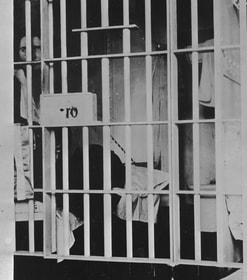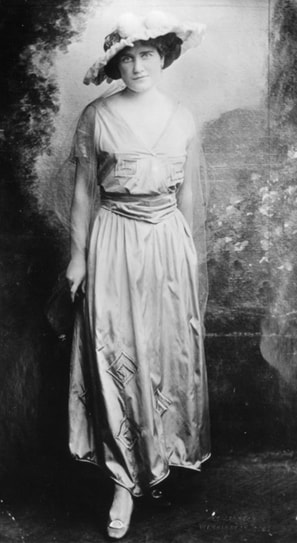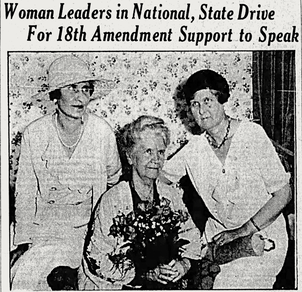|
The Women’s Marseillaise Arise! ye daughters of a land That vaunts its liberty! May restless rulers understand That women must be free That women will be free. Hark! hark! the trumpet’s calling! Who’d be a laggard in the fight? With vict’ry even now in sight And stubborn foemen backward falling To Freedom’s cause till death We swear our fealty. March on! March on! Face to the dawn The dawn of liberty. March on! March on! Face to the dawn The dawn of liberty. Arise! Tho’ pain or loss betide Grudge naught of freedom’s toll For what they loved the martyrs died; Are we of meaner soul? Are we of meaner soul? Our comrades greatly daring. Thro’ prison bars have led the way: Who would not follow to the fray, Their glorious struggle proudly sharing? To Freedom’s cause till death We swear our fealty. March on! March on! Face to the dawn The dawn of liberty. March on! March on! Face to the dawn The dawn of liberty Words: Miss F.E.M. Macaulay |
Vida Milholland was born on January 17, 1888, just seventeen months after her more-famous sister, Inez Milholland. The sisters were close in many ways besides age. Both went to Vassar College where they excelled in academics, athletics and drama. They also enjoyed spending time at Meadowmount, the family’s estate in Lewis, New York. Yet their lives took different paths; Inez pursued law studies and championed social causes while Vida chose a career in music as an opera singer.
Inez Milholland became the “New Woman” of the suffrage movement, famous for riding a white horse at the front of the 1913 Washington, DC, Suffrage Parade. Three years later, the National Woman’s Party (NWP) recruited her to go on a 1,200-mile suffrage tour. The strategy was to campaign against the re-election of President Woodrow Wilson since he had not supported a federal suffrage amendment for women. Vida accompanied Inez on the fast-paced excursion and reportedly sold her jewelry to finance the trip.
When the already-ill Inez became worn out from the train travel and grueling schedule, Vida tended to her sister’s health and sometimes served as a stand-in speaker. They made it to Los Angeles, California, when Inez suddenly collapsed on stage and was taken to the hospital. Vida submitted to blood transfusions to heal her sister, but all efforts failed. Inez Milholland died of pernicious anemia on November 25, 1916, at the age of 30, with her family by her side. As plans for a memorial were discussed, Vida said: “I am sure she does not want us to mourn her now, but to hurry up and do something to make the world better. The keynote of her life was hope. She hated moping around and talking about how bad things were, as much as she loved plunging in to set them right.”
It was now Vida who plunged in to carry the suffrage banner. Despite heavy rain and cold temperatures, she led an inauguration day parade around the White House complex on March 4, 1917. Vida carried a gold banner with the words “Mr. President, how long must women wait for liberty?” the last words spoken by Inez in Los Angeles.  Vida Milholland in jail cell, 1917 Vida Milholland in jail cell, 1917
A few months later, Vida joined the Silent Sentinels in their picketing of the White House on Independence Day, July 4, 1917. A mob of about a thousand men and boys charged at the women pickets. The police captain told Vida, “If you go back, you will not be molested.” Instead, Vida kept marching, and her picket squad followed. The crowd rushed at the women and broke their banners as police began arresting the women “for unlawful assemblage.” Thirteen members of the NWP, including Vida, were taken into custody. During her three days in the District of Columbia jail, Vida sang “The Women's Marseillaise" and other songs to inspire her fellow prisoners.
In 1919, she toured the country as part of the “Prison Special,” which publicized the mistreatment of the suffragists and promoted the suffrage cause. A highlight at each stop was a singing performance by Vida. Three months after the conclusion of the Prison Special tour, Congress voted for passage of the 19th Amendment (June 1919); ratification came in August 1920. After women won the right to vote, Vida Milholland continued to honor her sister. In the “Forward Into Light” pageant held in 1924 at Meadowmount, Vida dressed in a white Crusader's costume and rode atop a white horse to represent Inez’s role in women’s history. The next year, Vida's father, John Milholland, died and Vida became manager of the Meadowmount estate (now Meadowmount School of Music).
|



